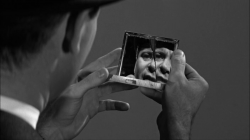by NEIL SINYARD

One of the finest and most influential books of film theory, Peter Wollen’s Signs and Meaning in the Cinema (1969) has, I think, one particularly fine but not very influential sentence. At the end of his chapter on the auteur theory, he writes: ‘We need comparisons with authors in the other arts: Ford with Fenimore Cooper, for example, or Hawks with Faulkner.’1 I used that observation as the starting point of one of the chapters in my book, Filming Literature (which is itself nearly 30 years old now) and it was always my favourite chapter of the book. I called it ‘Kindred Spirits’; and the kindred spirits I compared were Charles Dickens and Charlie Chaplin, Mark Twain and John Ford, Joseph Conrad and Orson Welles, and Graham Greene and Alfred Hitchcock.2
Such comparisons have continued to interest me; and certainly in those particular cases I’ve discovered many more points of contact than I realised at the time. In the case of Dickens and Chaplin, I’d no idea at that time that Chaplin had actually given a talk to the Dickens Fellowship in London in 1955, attracting a record attendance of over 300 members and calling his talk ‘The Immortal Memory of Charles Dickens’; or that, during the last year of his life in 1977, Chaplin had obsessively read and re-read Oliver Twist, obviously because it reminded him so sharply of his own appalling childhood and experience in the workhouse. In the case of Graham Greene and Alfred Hitchcock, at time of writing that chapter and comparing Greene’s Our Man in Havana and Hitchcock’s North by Northwest, I had no idea that Hitchcock had tried to buy the rights of Our Man in Havana nor that he had once approached Greene to write the screenplay of his most overtly Catholic film, I Confess (a fact, incidentally, that is still surprisingly omitted from most Greene biographies). I was later to expand on this comparison in my book on Graham Greene;3 and, in fact, the writer-director Neil Jordan has commented on the connection between these two and wondered about what he called Greene’s ‘strange miasma about the work of Alfred Hitchcock’, without doubt Greene’s biggest blind-spot as an otherwise exceptional film critic, which he never corrected and which Jordan rightly thought seemed a little suspect: ‘And there must be another book to be written,’ as he put it, ‘about the lack of contact between these two poets of English criminality and bad conscience’.4
